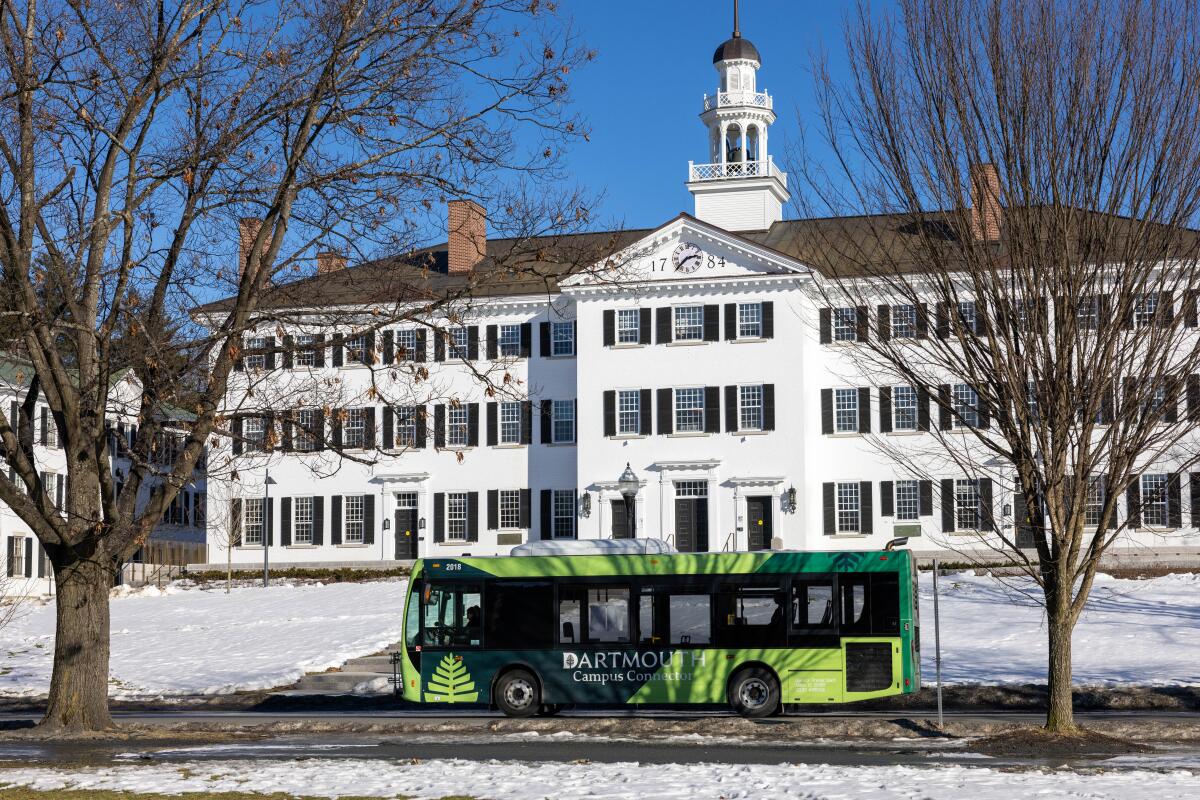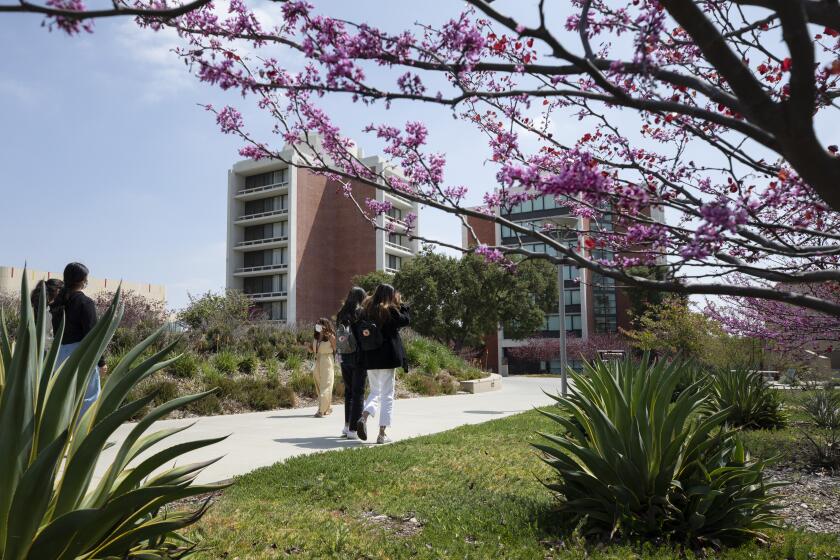Opinion: So Dartmouth will require the SAT again. Here’s what really matters for Californians seeking degrees

Dartmouth’s decision last week to reinstate its SAT or ACT requirement for admissions, and recent coverage extolling the benefits of standardized testing in predicting college success, have thrust testing into higher education news yet again. This will not be a surprise to Californians. In 2021, the University of California concluded a highly publicized effort banning the test for admission. California State University followed soon after.
Enough. Some schools will mandate standardized testing, others will not, and some might change their minds. The extent to which the SAT predicts college success or helps identify exceptional students is a debate that, like many concerns in pre-pandemic America, needs to be retired — or at least reconsidered in light of higher education’s current struggles.
Now that the Supreme Court has struck down affirmative action, elite schools should recruit from a neglected pipeline: transfer students from community colleges.
For the record:
12:02 p.m. Feb. 16, 2024A prior version of this piece incorrectly identified Eileen Strempel as inaugural dean of the Herb Albert School of Music. It is the Herb Alpert School of Music.
It is not that testing battles and elite admissions have no importance. Rather it is the fact that higher education has a much bigger set of challenges, including degree completion, affordability and a rapidly sinking reputation.
Nationally, only about 6 in 10 students who enter college ever earn a credential or a degree in six years, and far fewer graduate on time (four years), the National Student Clearinghouse found. According to the University of California public dashboards, 72.9% of UC students graduate in four years; Cal State’s dashboards show a rate of just 35.5%. Completion rates for students from low-income, historically underrepresented or rural backgrounds are even lower.
Those students who leave frequently carry with them a trifecta of dismay: some college experience, loan debt and no degree. The result? We now have more than 40 million Americans with some college and no degree to show for it.
Higher education’s struggles have not gone unnoticed. The percentage of Americans expressing confidence in our colleges and universities has sunk to a new low of 36%, down from 57% about a decade ago. According to a recent survey, at least half of currently enrolled high school students — the traditional cohort entering colleges and universities — are less interested than ever in taking the time or paying the money to earn a college degree.
Legacy admission is on the wane but colleges are doubling down on early decision, another admissions practice that favor the wealthy.
And those who do enter college face threats to their basic needs that undermine their ability to complete a degree. A 2023 California Student Aid Commission Report revealed that an appalling 53% of respondents identified as housing insecure, while 66% were food insecure.
At the same time, many studies, including a 2024 report from Georgetown University’s Center on Education and the Workforce, affirm the substantial economic value of earning a postsecondary degree. This is in addition to other benefits including better health, higher levels of voter participation and volunteering, greater job satisfaction and greater social mobility.
So how do we give more Americans access to those benefits? Not by obsessing over big-name institutions’ use of the SAT or ACT. These schools and their testing (or lack thereof) appear to entrance the media. But the extremely competitive Harvards and Stanfords of the world account for just about 4% of U.S. college students. For financial and other reasons, the majority of Americans will not pursue an elite college education.
Thus in California and in other parts of the country, what matters more is how higher education leaders are maneuvering their campuses toward greater affordability, student inclusivity and better degree attainment.
A chaotic rollout of a new federal financial aid form is roiling high schools and upending college admissions, impeding students from filling out the all-important FAFSA form.
Consider the free college movement. While it may not be gaining federal traction, at least 32 states have some form of free college, including California Promise programs that support more than 1 million students annually in the Golden State. State-supported free college is gaining momentum with bipartisan support and may be one of the most fruitful paths toward wider affordability.
On the degree completion front, focused efforts in Georgia have shrunk equity gaps between Hispanic and white non-Hispanic students pursuing their associates degrees. This success challenges outcomes in California, where 58% of Asian and 41% of white young adults born in the state have a bachelor’s degree, compared with 25% of Black and 20% of Latino students.
It’s also worth taking note of rural students living in learning “deserts” where there is no institution of higher education within 50 miles. Those students, not surprisingly, are much less likely to attend college. But access is expanding; in at least 23 states across the country, including California, community colleges can now offer bachelor’s degrees.
As for supporting students once they are on campus, although much more progress should be made, the mandated establishment of basic needs centers at California’s community colleges is a step in the right direction. These “one-stop” centers connect students to food pantries, housing assistance and additional resources such as the CalFresh nutrition program.
All of this good work is happening largely on unheralded college and university campuses where standardized admissions tests are often not required and even irrelevant. Let’s focus our attention on these issues and on those institutions that are trying to serve all students, not merely the most favored.
Stephen Handel is the strategy director for postsecondary education transformation at ECMC Foundation in Los Angeles and previously worked for UC systemwide admissions and the College Board. Eileen Strempel is the inaugural dean of the Herb Alpert School of Music and a professor of education at UCLA.
More to Read
A cure for the common opinion
Get thought-provoking perspectives with our weekly newsletter.
You may occasionally receive promotional content from the Los Angeles Times.









